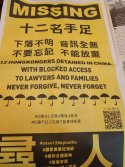The narrative relies on people being brainless/clueless.
The talk of "Chinese people not being free" is total nonsense. We know this.
Yes it's true what you said, but it still require propaganda on the level of mind bending abilities like those displayed by one of our members here.
I mean Kong Kong was rated by a number of their (western) agencies as the freest place in the world. Yet their propaganda machine have managed to nullified that and successfully claimed to their audience that Hong Kong people are fighting for their "freedom".
So it required stupidity on behalf of the audience and manipulation of the mind bending variety by the western government.
BNO是不是要死?
Not much difference between Canton dialect and Mandarin in this particular case. 45414 is "Shi Wu (Bu) Shi Yao Si" in Mandarin, "Xi Wu Xi Yao Sei" in Canton dialect (using Pin Ying spelling approximation though).

The only perk is 5 Wu 无,it means the same No/Not in both dialect except Mandarin use Bu 不 in stead, understandable but both speakers. Pretty much like Chinese can understand Kanji in Japanese to some extent.
I take it you are not Chinese speaker (either Cantonese or Mandarin). Because:
The 'Yao' sei. Is not 'Yao' as in one. It is 'sub sei' as in ten four or fourteen. But ten 'sub' also sound like must.
So the true translation is 'must die'
Also the 5 in Cantonese is mmm. Never wu.
Cantonese uses the same writing as Mandarin. Where as Japanese kanji is a copy. Therefore your comment on kanji is so wrong. The Chinese understand kanji is because the Japanese uses Chinese 'Hanji' litually means HAN as in HAN dynasty writing. You made it sound like the other way around.
that's a strange promise... pay to the bearer on demand 50 HK dollars? but that bill is already 50 HK dollars... so they're just taking the bill and then giving the same bill back? or a different 50 HK bill?... also by order of the board of directors sounds kinda lame...
Yes it's nothing with that. I'm not sure where you come from. But if you look at any UK Or US bank notes. It would say exactly the same thing. Because it is nothing more than promissory note. It's an IOU from the bank.
B N O 4 5 4 1 4 = 死 唔 死 必 死 也。 哎呀!唔點啦!唔點啦!
That would be the way I would deconstruct it.

edit,
(note that 必 also is 一定 and it has the up/enter tone, so that kind of ties that in, if we want to get more linguistic about it, okay, I shut up now).
Ai ya!


See above.
That is actually a quirk of the HK monetary system.
There are different banks authorized to print bills on behalf of the government, Bank of China, HSBC, Standard Chartered.
So technically the money (in bill form) is from the bank, and not the government.
Yes and no.
In the UK. We have bank notes from the bank of England. But this is only legal tender in England. In Scotland we've there banks that print money. And in northern Ireland we have four banks that print money.
So inbthe U.K. only, we have 8 banks that prints money inferring to 8 different monetary authority. This is of course not so. Just as in Hong Kong.
The government of the U.K. though authorised the bank to print money, but they are in fact controlled by a central authority. Ie the British government. For instant, for every bank note that is printed in Scotland. In theory, they must have the same value in English note in their vault to back it up. And in the days of gold standard, the bank if England must have gold to back that up.
Of course, since the abandonment of the gold standard. It is now only on trust. Hence it is known as FIAT money.
God help us. Or 'in god we trust'

